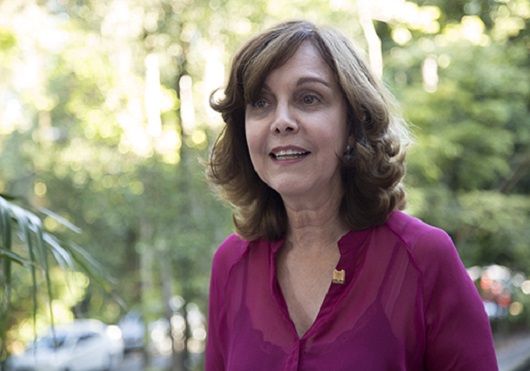COVID-19: Fiocruz virologist is part of WHO advisory group
17/12/2021
Maíra Menezes (IOC/Fiocruz)
When the World Health Organization (WHO) decided to classify the Omicron strain of the new coronavirus as a variant of concern, it took into account the recommendations of a group of specialists. The so-called Technical Advisory Group on Sars-CoV-2 Evolution (TAG-VE) is a select group of scientists that includes a Brazilian virologist in its line-up: Brazilian researcher Marilda Siqueira, chief of the Laboratory of Measles and Respiratory Viruses of the Oswaldo Cruz Institute (IOC/Fiocruz).
The advisory group consists of 25 scientists of excellence in different specialties, such as virology, bioinformatics, and epidemiology. They also represent different regions of the world. Siqueira and a Chilean researcher represent Latin America.
Marilda Siqueira is the chief of the Laboratory of Measles and Respiratory Viruses of the IOC/Fiocruz (Image: Josué Damaceno/IOC)
The Technical Advisory Group was made official by the WHO in October. However, these scientists had been meeting, at the request of the WHO, since June 2020, to evaluate mutations in the viral genome and the emergence of coronavirus variants, creating an informal workgroup on viral evolution. Following the formalization, the specialists started meeting regularly, at least twice a month, in addition to attending extraordinary summons, as has been happening since the omicron variant was first detected.
“We are in an alert system, having frequent meetings to follow from up close all the indicators related to this variant. Up to this moment, we know the mutations in the Omicron genome that are markers for potentially higher transmissibility, but we don’t yet know how much of an impact this will have on hospitalizations and deaths, in particular”, says Siqueira.
The first known case of infection by the new variant was confirmed in South Africa, in a sample collected from a patient on November 9th. On November 24th the country warned the WHO that this new variant had been detected. Two days later, the Technical Advisory Group held a meeting that recommended classifying the Omicron as a variant of concern, considering that evidence points to a change that is harmful to the epidemiology of COVID-19.
According to Siqueira, the consequences of omicron dissemination will likely be more severe in regions with low vaccination coverage, such as the African continent. However, studies are still necessary to evaluate the level of effectiveness against the new variant of the vaccines that are currently available, and individual protection measures, such as wearing masks, washing of hands and social distancing, must be adopted by everyone.
“We have different scenarios in the world. South Africa is one of the continent’s countries with higher rates of vaccination, with 28% of its population now immunized. This is a scenario in which a new variant probably has more impact in places where vaccination rates are higher. In Brazil, a large portion of the population has already had both vaccine doses, and many risk groups, such as the elderly, have already had booster shots. This could be a positive thing for us in Brazil, but vaccination must be accompanied by individual protection measures that must not be abandoned right now”, states the researcher.
Genomic surveillance
The fact that the Omicron variant was first detected in South Africa does not necessarily mean it appeared in that country. The strain may well have originated elsewhere. However, thanks to their genomic surveillance, South African scientists were the first to decode its genome, identifying its impressive number of mutations and raising the alarm on the risks it poses to public health.
The virologist emphasizes the relevance of this kind of work. As a National Reference Center for Respiratory Viruses for the Ministry of Health and a Reference in COVID-19 in the Americas for the WHO, the IOC/Fiocruz Laboratory of Measles and Respiratory Viruses works routinely with the genetic sequencing of samples and closely follows the evolution of coronavirus genome, attempting to identify mutations with possible impact on public health.
The Laboratory is also part of the Fiocruz Genomic Network, which brings together specialists from all Fiocruz units and partner institutions to generate robust data on the genome of the Sars-CoV-2 in Brazil.
“Mutations in the genome may signify, for instance, that the virus has more transmission capacity, can cause more severe disease, or has the potential to escape the immune response induced by vaccines or by a previous natural infection. These issues must be followed closely, because they directly influence the strategies used by the ministries of health in different countries, as they attempt to keep the COVID-19 pandemic under control”, Siqueira adds.





